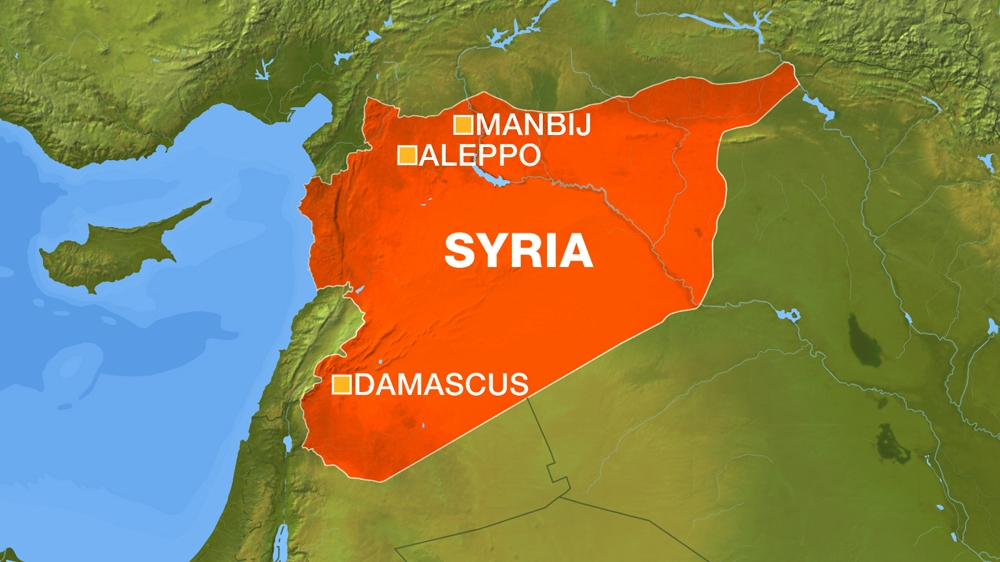
Turkey has been complaining
about US support for the Kurdish YPG for years, and this week, that has
boiled down to an overt ultimatum, with Turkey’s Foreign
Ministry demanding the US immediately withdraw from the Syrian city of Manbij.
The
US helped the YPG capture Manbij early last year, and Turkey has been mad
because their position is the Kurds can have no territory west of the Euphrates
River. Though Manbij is on the river, it is primarily on the western bank.
With
Turkey’s recent invasion of the Afrin District, they’ve made it clear that
Manbij will be their second target in the invasion. This could be a potential
problem, since the US has troops in the city, which were put there in the first
place to preclude a Turkish invasion.
In
recent days, Turkish officials have suggested they are willing to not only
invade whether the US leaves or not, but suggested that US troops
would be
targeted if they continue to help the Kurds in the city.
This
risks being a long-term issue for the US beyond Manbij, however, as Turkey has
said all of Syrian Kurdistan is a target, and all US troops in Syria are
deployed into Kurdish territory, meaning this could boil down to Turkey forcing
a US pullout.
Turkey
is claiming a US concession already made, in that the US supposedly has pledged a halt to all
arms for the Kurds. This is a long-standing Turkish demand, but the
US has yet to confirm that this indeed will be the case.
If
Turkey is not bluffing, U.S. troops in Manbij, Syria, could be under fire by
week's end, and NATO engulfed in the worst crisis in its history.
If the Turks attack Manbij, the U.S. will face a choice: Stand by our Kurdish allies and resist the Turks, or abandon the Kurds.
Should the U.S. let the Turks drive the Kurds out of Manbij and the entire Syrian border area with Turkey, as Erdogan threatens, U.S. credibility would suffer a blow from which it would not soon recover.
But to stand with the Kurds and oppose Erdogan's forces could mean a crackup of NATO and loss of U.S. bases inside Turkey, including the air base at Incirlik.
Turkey also sits astride the Dardanelles entrance to the Black Sea. NATO's loss of Turkey would thus be a triumph for Vladimir Putin, who gave Ankara the green light to cleanse the Kurds from Afrin.
Yet Syria is but one of many challenges to U.S. foreign policy.
The Winter Olympics in South Korea may have taken the threat of a North Korean ICBM that could hit the U.S. out of the news. But no one believes that threat is behind us.
Last week, China charged that the USS Hopper, a guided missile destroyer, sailed within 12 nautical miles of Scarborough Shoal, a reef in the South China Sea claimed by Beijing, though it is far closer to Luzon in the Philippines. The destroyer, says China, was chased off by one of her frigates. If we continue to contest China's territorial claims with U.S. warships, a clash is inevitable.
In a similar incident Monday, a Russian military jet came within five feet of a U.S. Navy EP-3 Orion surveillance plane in international airspace over the Black Sea, forcing the Navy plane to end its mission.
U.S. relations with Cold War ally Pakistan are at rock bottom. In his first tweet of 2018, President Trump charged Pakistan with being a duplicitous and false friend.
"The United States has foolishly given Pakistan more than 33 billion dollars in aid over the last 15 years, and they have given us nothing but lies & deceit, thinking of our leaders as fools. They give safe haven to the terrorists we hunt in Afghanistan, with little help. No more!"
If the Turks attack Manbij, the U.S. will face a choice: Stand by our Kurdish allies and resist the Turks, or abandon the Kurds.
Should the U.S. let the Turks drive the Kurds out of Manbij and the entire Syrian border area with Turkey, as Erdogan threatens, U.S. credibility would suffer a blow from which it would not soon recover.
But to stand with the Kurds and oppose Erdogan's forces could mean a crackup of NATO and loss of U.S. bases inside Turkey, including the air base at Incirlik.
Turkey also sits astride the Dardanelles entrance to the Black Sea. NATO's loss of Turkey would thus be a triumph for Vladimir Putin, who gave Ankara the green light to cleanse the Kurds from Afrin.
Yet Syria is but one of many challenges to U.S. foreign policy.
The Winter Olympics in South Korea may have taken the threat of a North Korean ICBM that could hit the U.S. out of the news. But no one believes that threat is behind us.
Last week, China charged that the USS Hopper, a guided missile destroyer, sailed within 12 nautical miles of Scarborough Shoal, a reef in the South China Sea claimed by Beijing, though it is far closer to Luzon in the Philippines. The destroyer, says China, was chased off by one of her frigates. If we continue to contest China's territorial claims with U.S. warships, a clash is inevitable.
In a similar incident Monday, a Russian military jet came within five feet of a U.S. Navy EP-3 Orion surveillance plane in international airspace over the Black Sea, forcing the Navy plane to end its mission.
U.S. relations with Cold War ally Pakistan are at rock bottom. In his first tweet of 2018, President Trump charged Pakistan with being a duplicitous and false friend.
"The United States has foolishly given Pakistan more than 33 billion dollars in aid over the last 15 years, and they have given us nothing but lies & deceit, thinking of our leaders as fools. They give safe haven to the terrorists we hunt in Afghanistan, with little help. No more!"
As for America's longest war, in Afghanistan,
now in its 17th year, the end is nowhere on the horizon.
A week ago, the International Hotel in Kabul was attacked and held for 13 hours by Taliban gunmen who killed 40. Midweek, a Save the Children facility in Jalalabad was attacked by ISIS, creating panic among aid workers across the country.
Saturday, an ambulance exploded in Kabul, killing 103 people and wounding 235. Monday, Islamic State militants attacked Afghan soldiers guarding a military academy in Kabul. With the fighting season two months off, U.S. troops will not soon be departing.
If Pakistan is indeed providing sanctuary for the terrorists of the Haqqani network, how does this war end successfully for the United States?
Last week, in a friendly fire incident, the U.S.-led coalition killed 10 Iraqi soldiers. The Iraq war began 15 years ago.
Yet another war, where the humanitarian crisis rivals Syria, continues on the Arabian Peninsula. There, a Saudi air, sea and land blockade that threatens the Yemeni people with starvation has failed to dislodge Houthi rebels who seized the capital Sanaa three years ago.
This weekend brought news that secessionist rebels, backed by the United Arab Emirates, have seized power in Yemen's southern port of Aden, from the Saudi-backed Hadi regime fighting the Houthis.
These rebels seek to split the country, as it was before 1990.
Iran, Saudi Arabia and the UAE appear to be backing different horses in this tribal-civil-sectarian war into which America has been drawn.
There are other wars — Somalia, Libya, Ukraine — where the U.S. is taking sides, sending arms, training troops, flying missions.
Like the Romans, we have become an empire, committed to fight for scores of nations, with troops on every continent, and forces in combat operations of which the American people are only vaguely aware.
"I didn't know there were 1,000 troops in Niger," said Sen. Lindsey Graham when four Green Berets were killed there. "We don't know exactly where we're at in the world, militarily, and what we're doing."
No, we don't, Senator.
As in all empires, power is passing to the generals.
A week ago, the International Hotel in Kabul was attacked and held for 13 hours by Taliban gunmen who killed 40. Midweek, a Save the Children facility in Jalalabad was attacked by ISIS, creating panic among aid workers across the country.
Saturday, an ambulance exploded in Kabul, killing 103 people and wounding 235. Monday, Islamic State militants attacked Afghan soldiers guarding a military academy in Kabul. With the fighting season two months off, U.S. troops will not soon be departing.
If Pakistan is indeed providing sanctuary for the terrorists of the Haqqani network, how does this war end successfully for the United States?
Last week, in a friendly fire incident, the U.S.-led coalition killed 10 Iraqi soldiers. The Iraq war began 15 years ago.
Yet another war, where the humanitarian crisis rivals Syria, continues on the Arabian Peninsula. There, a Saudi air, sea and land blockade that threatens the Yemeni people with starvation has failed to dislodge Houthi rebels who seized the capital Sanaa three years ago.
This weekend brought news that secessionist rebels, backed by the United Arab Emirates, have seized power in Yemen's southern port of Aden, from the Saudi-backed Hadi regime fighting the Houthis.
These rebels seek to split the country, as it was before 1990.
Iran, Saudi Arabia and the UAE appear to be backing different horses in this tribal-civil-sectarian war into which America has been drawn.
There are other wars — Somalia, Libya, Ukraine — where the U.S. is taking sides, sending arms, training troops, flying missions.
Like the Romans, we have become an empire, committed to fight for scores of nations, with troops on every continent, and forces in combat operations of which the American people are only vaguely aware.
"I didn't know there were 1,000 troops in Niger," said Sen. Lindsey Graham when four Green Berets were killed there. "We don't know exactly where we're at in the world, militarily, and what we're doing."
No, we don't, Senator.
As in all empires, power is passing to the generals.



